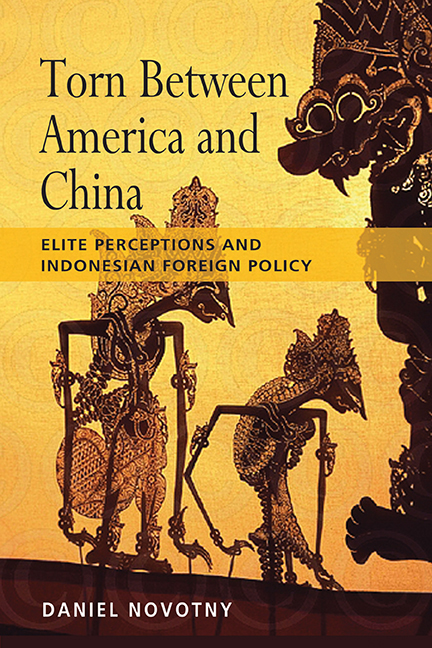Book contents
- Frontmatter
- Dedication
- Contents
- Foreword
- Preface
- List of Figures
- Acknowledgements
- PART I THE CONTEXT
- PART II THE PERCEPTIONS “ANTARA DUA KARANG”
- 4 Elite Perceptions of the United States
- 5 Elite Perceptions of China
- PART III ELITE CONSENSUS AND POLICY OUTCOMES
- Glossary
- Abbreviations
- Bibliography
- Index
- Note on the Author
4 - Elite Perceptions of the United States
from PART II - THE PERCEPTIONS “ANTARA DUA KARANG”
Published online by Cambridge University Press: 21 October 2015
- Frontmatter
- Dedication
- Contents
- Foreword
- Preface
- List of Figures
- Acknowledgements
- PART I THE CONTEXT
- PART II THE PERCEPTIONS “ANTARA DUA KARANG”
- 4 Elite Perceptions of the United States
- 5 Elite Perceptions of China
- PART III ELITE CONSENSUS AND POLICY OUTCOMES
- Glossary
- Abbreviations
- Bibliography
- Index
- Note on the Author
Summary
INTRODUCTION
Indonesia's attitude to the relationship with the United States in the post- Cold War period could reasonably be characterized as ambivalent and full of contradictions. Jakarta's view of America in the 1990s became more and more unfavourable. As the post-Cold War era progressed, Suharto's New Order regime was increasingly annoyed by the U.S. criticism of Jakarta's human right abuses and of its heavy-handed treatment of East Timor. The emerging distrust of America's intentions was further accentuated by the perception that Washington exploited Indonesia's weakness during the 1997 financial meltdown by making Indonesia dependent on the IMF and putting immense pressure on Jakarta to accept a multinational peacemaking force in East Timor. The United States, along with Australia and other Western powers was also alleged to be using NGOs as part of a conspiracy to separate the provinces of West Papua and Aceh from Indonesia.
The U.S.-launched War on Terrorism, the wars in Afghanistan and Iraq, further exacerbated the upsurge of negative attitudes towards America as a series of anti-American demonstrations swept Indonesia in the period of 2001–05. In particular, the military campaign to overthrow the Iraqi regime gave rise to a wave of anti-Americanism that swept through Indonesia and widened the rift between the two former Cold War anti-communist allies. Some Islamic groups in Indonesia demanded that the government cut the country's diplomatic relations with the U.S. As public opinion polls indicate, Indonesian view of the United States underwent a major shift in the first five years of the new millennium. While 75 per cent of them had a favourable opinion of the U.S. in 2000, three years later, 83 per cent of the Indonesian population held an unfavourable view of that country. Commenting on the poll's results, a report noted that “anti-Americanism has [not only] deepened, but it has also widened. … People see America as a real threat. They think we [America] are going to invade them.” Moreover, the 2004–06 research demonstrated that 51 per cent of Indonesian leaders considered the United States, in contrast to 33 per cent Australia and 27 per cent China, as the principal malign factor affecting Indonesia's national interest and security.
- Type
- Chapter
- Information
- Torn between America and ChinaElite Perceptions and Indonesian Foreign Policy, pp. 103 - 173Publisher: ISEAS–Yusof Ishak InstitutePrint publication year: 2010

